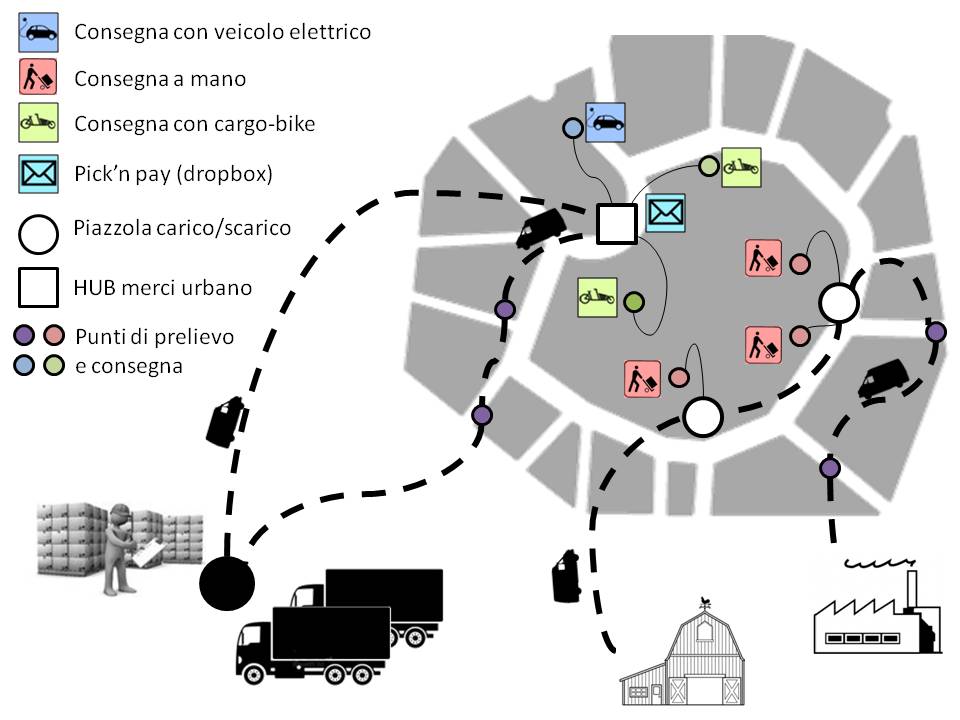A system for monitoring and optimizing last-mile logistics 
Funding programme: Bando Smart Cities della Regione Lombardia
Start – end year: 2014 – 2015
Partnerships
Project Automation S.p.A.
Consorzio Milano Ricerche
Italdata S.p.A.
Muoversi S.r.l.
Poliedra
Unimib (Disco e Diseade)
The project
The Opti-LOG project aims at testing and promoting innovative measures for the management and control of urban logistics, in order to improve the efficiency and the economic and environmental sustainability. In this regard, Opti-LOG will study the characteristics of a last-mile delivery service with low emission and zero emission vehicles, providing operators and the public administrations an advanced software platform for the optimization of logistics. The expected impacts from the project relate to the decrease of the pressure of commercial fleets on traffic and to the improvement of air quality in urban areas.
Objectives
Opti-LOG means to design, develop and test a software platform for an integrated management of last-mile logistics, enabling the following functionalities:
- a service allowing logistic operator to reserve load/unload areas (temporary parking slots at the edge of the roadway devoted to logistic activities); the areas will be equipped with ad hoc sensors to determine in real-time the presence of a vehicle;
- a system to optimize load factors and routes of last-mile operators, by an optimal assignment of goods to vehicles based on weight, volume, delivery constraints (e.g. planned delivery) and destination;
- a system for real-time track and trace of last-mile vehicles and of vehicles carrying dangerous goods on particular;
- a social networking platform supporting the aggregation of the demand of shipments and interaction among users willing to send or receive a parcel.
 Upon completion of the described functionalities, Opti-LOG will study models and behavior-based policies for management and control, in order to encourage good behaviors and virtuous choices by operators. The rewarding mechanisms within the social business will aim to aggregate demand and facilitate the optimization (eg. groups of delivery). Finally, the project will focus on measuring the effectiveness, in terms of reducing environmental and social externalities, of the identified logistics solutions for the last-mile, with regards to Business As Usual (BAU) scenarios. In this regard, evanuation scenarios will be defined, based on the four pilot-cities and for each of them the effects of different policies and configurations of the logistics of last mile will be simulated. The simulations at a local and micro scale will use both mathematical models of diffusion and dispersion of pollutants and models to estimate emissions.
Upon completion of the described functionalities, Opti-LOG will study models and behavior-based policies for management and control, in order to encourage good behaviors and virtuous choices by operators. The rewarding mechanisms within the social business will aim to aggregate demand and facilitate the optimization (eg. groups of delivery). Finally, the project will focus on measuring the effectiveness, in terms of reducing environmental and social externalities, of the identified logistics solutions for the last-mile, with regards to Business As Usual (BAU) scenarios. In this regard, evanuation scenarios will be defined, based on the four pilot-cities and for each of them the effects of different policies and configurations of the logistics of last mile will be simulated. The simulations at a local and micro scale will use both mathematical models of diffusion and dispersion of pollutants and models to estimate emissions.
